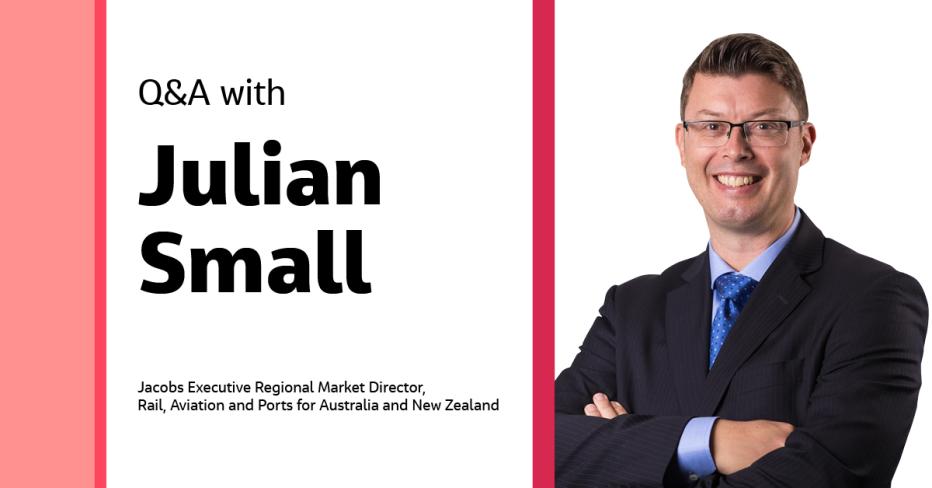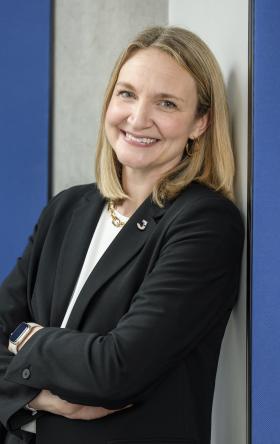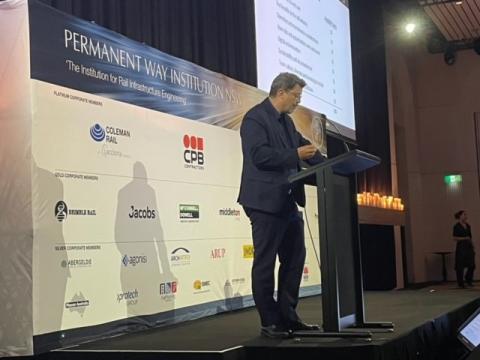With over 33 years of experience with major international private and government employers, our Executive Regional Market Director, Rail, Aviation and Ports for Australia and New Zealand Julian Small possesses varied experience in transportation, infrastructure and mixed-use developments.
We sat down with Julian to discuss the rapid innovation in the transportation industry, the emerging trends to look out for and the transformation underway in aviation after the last few tumultuous years.

Hi, Julian. Can you tell us how the work you do is helping deliver Jacobs’ strategy?
The core elements of Jacobs' strategy have been a growing focal area for our transport business for many years now. We are supporting Australia's coastal resilience programs and maritime ecology. We are delivering several decarbonization projects across our rail, ports and aviation markets and recently won the CFO Sustainability Award for our efforts in rail decarbonization. We are establishing digital twins and supporting digital asset management for local railway operators. We advise our clients on various business and investment cases and strategies.
You have over 33 years of experience with major international private and government employers, so tell us a bit about yourself and your role at Jacobs.
I’m originally from the U.K. but have spent much of my career in Asia, the Middle East, Australia and New Zealand. I’ve been extremely fortunate to have been involved in many high-profile projects across these regions, working alongside some inspiring industry leaders. In my extensive career, I have worked across diverse projects and held various roles covering design management, construction management, and project leadership for government clients, consultants and contractors. I have held corporate and operational executive leadership positions with previous employers.
My current role at Jacobs is to lead our business growth in the Rail, Ports and Aviation sectors across Australia and New Zealand. Utilizing my project delivery and business leadership background, I am accountable for developing and achieving our business strategy, fostering client relations and driving transformational growth. Our rail business has increased three-fold since I joined Jacobs in October 2019 and has now become the largest part of our business in the region. Our ports and aviation businesses are promising significant growth as these markets emerge from the recent challenges of the pandemic. It’s a very exciting time to lead these markets, which continue to underpin fundamental improvements to our everyday lives.
Finally, I firmly believe in leveraging inclusion and diversity in the workplace and am a staunch advocate for multiculturalism. We can only truly drive enhancement, development and innovation in our industry by embracing diverse thinking.
With rapid innovation in the transportation industry, what are some emerging trends to watch out for?
Transportation is an essential aspect of our communities. It literally brings us closer together, driving urban growth, economic prosperity and improvements to our everyday lives.
Over the past 30 years, rail has been experiencing ever-increasing investments. The increased investment in creating mass transit systems and public transportation networks, centered around decarbonization and sustainability benefits, is thankfully becoming founded on policies developed by environmentally conscious governments. Rail realizes benefits that are driving other trends in the market, including the creation of public spaces, precincts and places, utilization of rail to stimulate economic growth and support town planning objectives, focus on more aggressive sustainability targets for carbon reduction, biodiversity and climate resilience, improvements to customer experience and greater industry collaboration.
Aviation has always been at the cutting edge of innovation and technology. In recent years we have seen increasing use of biometrics, automation, digital security and passenger self-operation. Airports are witnessing a transition in the ownership and management structure from public to fully private airports, creating opportunities for greater and more diverse investment in and around our airports. The notion of the airport city, or ‘Aerotropolis,’ is all about building a community of support functions around the airport, including retail, commercial, hospitality and residential. Airport-associated employment is very significant and can help support this vision. Sustainability is becoming very important for our airports. Green airports have high standards to limit noise and air pollution and airlines are exploring carbon neutrality. Airports are increasingly focused on utilizing energy through renewable sources and improving energy management solutions.
Finally, the ports and marine market is seeing the most significant transformation at the moment. Our ports are reinventing themselves as green energy hubs as fossil fuel transportation is becoming less prevalent. Shipping of goods across our oceans has increased exponentially in recent years resulting in increasingly more gigantic container ships requiring bigger and smarter port and container handling facilities. There has been a quiet boom happening in leisure cruising with a massive increase in the size and number of leisure craft. Our marine specialists are increasingly involved in offshore wind farms, coastal resilience to extreme weather events, and nature conservatism. Other sustainability-focused trends include zero-emission vessels.
“Transportation is an essential aspect of our communities. It literally brings us closer together, driving urban growth, economic prosperity and improvements to our everyday lives.”
What are the key challenges and opportunities for the evolving transportation industry?
Opportunities center around innovatively embracing and responding to the emerging trends outlined in the previous answer.
Key challenges remain the availability of skills and resources and modernizing cultures and behaviors in our industry. There are still challenges to continued investment in rail, especially in Australia and New Zealand. For airports and aviation, the number of people associated with the aviation industry declined massively during the pandemic. Now that air travel is starting to reach normality again and the industry is rebounding, there is a real problem sourcing experienced people to help plan, design, manage, build and operate our airports. A similar but not as severe situation exists in the ports and maritime sector.
After the last few tumultuous years, the aviation industry is now poised to grow by adjusting business models, embracing digitalization and investing in infrastructure. What excites you about the future of aviation?
Of all the markets in the construction sector, aviation is about to experience the most comparative growth. Our airports have lost over two years in delivering their master plan ambitions due to the pandemic. As air travel is rebounding at pace, there has been a noticeable increase in investment activity across the industry in terms of airport acquisition and private ownership and a resurgence of spending on asset improvement and expansion. This, coupled with continuing technological advancements, means the aviation sector is a very exciting place to be right now.
How do Jacobs’ innovative, sustainable aviation solutions help unlock the full potential of our airport partners?
Jacobs is one of the leaders in airports and aviation. We have been ranked in the top two places in this sector category for several years consecutively by Engineering News-Record (ENR) - the benchmark for our industry. Jacobs’ market position is underpinned by consistently delivering high-value services to this sector and being at the forefront of innovation and technology. We have several technical papers and publications that can be accessed on our website, outlining how our innovations in sustainability, environmental resilience, per-and poly-fluoroalkyl substances (PFAS), terminal planning and design, project management, airside and landside works and other factors shape the way our airport and aviation clients are achieving their ambitions.
People would be surprised to know that…
I once featured in a TV commercial for an amusement arcade in Pennsylvania in the U.S. I was studying at Pennsylvania State University at the time…it was very cheesy!
Tell us a little bit about what you like to do in your downtime.
I have four adorable children (even the three older teenagers!) and I love watching them playing for their respective club sports teams, including soccer, basketball, netball and rugby.
What do you enjoy most about being part of #OurJacobs?
As a very large and successful multinational organization, Jacobs constantly pushes boundaries in response to ever-changing market trends and drives exceptional service - an integral part of the culture. What is particularly unique in Jacobs is that it is genuinely trying to change our industry regarding inclusion, diversity, respect and ethical conduct. These are deeply rooted in our corporate behaviour and are driven relentlessly by our leadership
About the interviewee
Julian originates from the United Kingdom. Educated at the University of Leeds, he received his Master's Degree (Hons) in architectural engineering. He is married with four children and lives in Sydney.
Julian is the Executive Market Director for Jacobs' rail, ports and aviation business for Australia and New Zealand. He has over 33 years of diverse experience with major international private and public employers and is an experienced business leader, project director and government advisor.
Julian has led the delivery of major transport infrastructure projects across the U.K., Middle East, Asia, Australia and New Zealand, including rail, aviation and ports projects.
















































